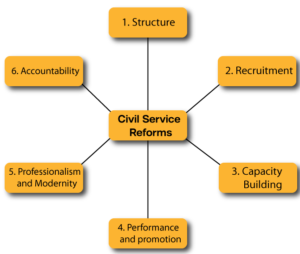Relevance: Sociology: Max Weber- Social action, ideal types, authority, bureaucracy, protestant ethic and the spirit of capitalism.
G.S paper IV: Ethics: Aptitude and foundational values for Civil Service , integrity, impartiality and non-partisanship.

Context:
Corporate coherence is the ability of the bureaucracy internally to resist the invisible hands of personal maximisation by undercutting the formal organisational structure through informal networks.
Why in news?
Prime Minister Narendra Modi, replying to the debate on the motion of thanks to the President’s address to the Lok Sabha, made a strong case for the privatisation of PSUs and said:
“If one becomes an IAS officer will he also run a fertiliser factory… Will he run a chemical factory too…
Will he fly aeroplanes? What are we going to achieve by placing the country in the hands of the babus?
Analysis
- In the 1950s and ’60s, the private sector had neither the capability to raise capital to build these plants nor the ability to manage them. The state had to take on the role of industrialising the country by establishing PSUs.
- This was in tune with the thinking of the time that the commanding heights of the economy should be in public hands.
- The civil services became the natural choice for establishing and managing these units.
- They delivered substantially, if not fully. Even after privatisation, the bureaucracy would be required for the transition of PSUs from the public to the private sector and providing the needed state support to make privatisation a success.
The PM’s goal of making India a $5-trillion economy needs a coherent structural transformation agenda and extraordinary implementation capacity.
- Since Independence, the political survival of Indian regimes has required pleasing a powerful land-owning class and a highly concentrated set of industrial capitalists.
- The elites of business houses and land owners share no all-encompassing development agenda. They confront the state seeking advantage for themselves.
The second challenge is to implement the developmental agenda.
- While the agenda is an outcome of political choices, the thinking goes that market mechanisms should be used as far as possible to make economic choices.
- This argument is at the heart of the privatisation of state assets. However, markets operate well only when they are supported by other kinds of social networks, which include non-contractual elements like trust.
- They are also inextricably embedded in a matrix of cultural understandings and intertwined with forms and policies of the state. Particularly in industrial transformation, there must be an essential complementarity of state structures and market exchange.
- Only a competent bureaucracy can provide this. It is for this reason that Max Weber argued that the operation of large-scale capitalist enterprise depended upon the kind of order that only a modern bureaucratic state can provide.
- He pithily added that capitalism and bureaucracy have found each other and belong together. This may seem strange because bureaucracy, in general, is associated with delays in operation, action centred on opaque standards, excessive requests for documentation, or even countless difficulties in meeting users or customers’ requests.
- However, a state without a bureaucracy cannot exist. Sardar Patel, speaking in the Constituent Assembly, said: “These people (civil services) are the instruments. Remove them and I see nothing but a picture of chaos all over the country.”
- He continued that the service must have independence and sense of security: “The union will go — you will not have a united India, if you do not have a good All-India Service which has the independence to speak out its mind, which has a sense of security that you will stand by your word, and after all there is a Parliament, of which we can be proud, where their rights and privileges are secure.”
- He made it quite clear that the political and permanent executives had to work as a team through mutual respect for each other’s roles as defined in the Constitution.
- Every slip from these ideals has lowered the capacity of the state to deliver.
- This is the result of electoral politics where the essence of the state action is the exchange relationships between the incumbent governments and its supporters.
- The incumbents directly distribute resources to the supporters through subsidies, loans and jobs.
- And create rents for the favoured by using its rule-making authority to restrict market forces and imports through tariffs or quantities.
- All this is achieved by undermining the impartiality of the bureaucracy in implementing rules and giving opinions frankly.
- The power to transfer is weaponised to bring the bureaucrats to heel and it works because authority sits with the position not the person. A difficult person can be replaced and sidelined.
- The pressure on officials to behave contrary to the ostensible purpose of the department undermines to a great extent the ability of the state to promote development.
- If privatisation is to work, then the corruption-transfer mechanism and its effects on the bureaucracy has to go.
This is not all. There has to be a corporate coherence within the bureaucracy and a buy-in to the transformative agenda of the government. Corporate coherence is the ability of the bureaucracy internally to resist the invisible hands of personal maximisation by undercutting the formal organisational structure through informal networks. If this goes too far, then everything becomes open to sale and the state becomes predatory.
The central question is:
Do we as a society have the ability to fight the increasing tendency to grab public resources and replace it by a shared developmental agenda acceptable to both business and landed elites and restore to the bureaucracy its autonomy of action as envisaged in the Constitution by de-weaponising transfers?
Max Weber Bureaucracy Theory
Max Weber, a German scientist, defines bureaucracy as a highly structured, formalized, and also an impersonal organization.
He also instituted the belief that an organization must have a defined hierarchical structure and clear rules, regulations, and lines of authority which govern it. Max Weber bureaucracy ideally has the following characteristics:
- Specialization of labor
- A formal set of rules and regulations
- Well-defined hierarchy within the organization
- Impersonality in the application of rules
Max Weber’s Bureaucratic Form – 6 Major Principles
Max Weber listed six major principles of the bureaucratic form as follows:
- A formal hierarchical structure– In a bureaucratic organization, each level controls the level below it. Also, the level above it controls it. A formal hierarchy is the basis of central planning and centralized decision-making.
- Rules-based Management– The organization uses rules to exert control. Therefore, the lower levels seamlessly execute the decisions made at higher levels.
- Functional Specialty organization– Specialists do the work. Also, the organization divides employees into units based on the type of work they do or the skills they possess.
- Up-focused or In-focused Mission– If the mission of the organization is to serve the stockholders, board, or any other agency that empowered it, then it is up-focused. On the other hand, if the mission is to serve the organization itself and those within it (like generating profits, etc.), then it is in-focused.
- Impersonal– Bureaucratic organizations treat all employees equally. They also treat all customers equally and do not allow individual differences to influence them.
- Employment-based on Technical Qualifications– Selection as well as the promotion of employees is based on technical qualifications and skills.

